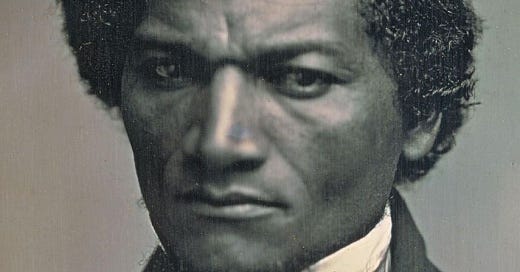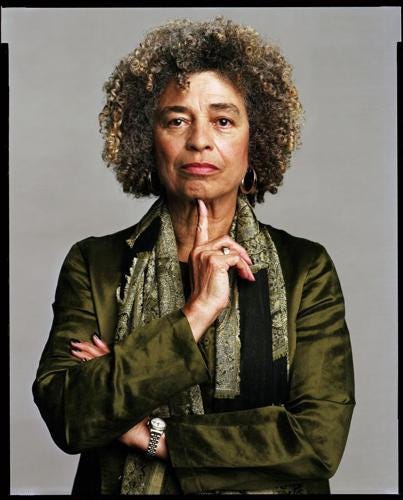My earliest memory of learning about black history in school includes Frederick Douglass - probably the most influential Black American of the nineteenth century- who dedicated his life to agitating the American conscience.
In our journey of understanding and confronting the enduring struggles of racism, the teachings of Frederick Douglass and the insights from this week's Torah portion, Terumah, offer some guidance. Douglass, a monumental figure in the fight to end American chattel slavery, remains relevant for his resilience and advocacy. His words, emphasizing the necessity of struggle for progress, resonate deeply with our contemporary efforts to dismantle systemic racism. Similarly, Terumah's teachings on collective contribution and divine-human collaboration provide a spiritual framework for understanding our roles in these efforts.
If there is no struggle, there is no progress. Those who profess to favor freedom, and yet depreciate agitation, are men who want crops without plowing up the ground. They want rain without thunder and lightning. They want the ocean without the awful roar of its many waters. This struggle may be a moral one; or it may be a physical one; or it may be both moral and physical; but it must be a struggle. Power concedes nothing without a demand. It never did and it never will. - Frederick Douglass
Douglass' assertion, "If there is no struggle, there is no progress," underscores a timeless truth: meaningful change in the fight for justice is achieved through persistent, forceful, and often uncomfortable efforts. He highlighted the importance of being visible and active in the struggle for emancipation and equality, a critically relevant message today. In our current context, this translates into a call for active participation in the fight against racism, recognizing that silence and inaction serve only to uphold the status quo. Douglass' life reminds us that social justice movements require the visible and vocal involvement of those who seek change, echoing the need for continuous agitation to challenge and dismantle systemic inequalities.
The Torah portion Terumah offers a complementary perspective, focusing on the construction of the Mishkan, a sanctuary for God's presence among the Israelites. This task required contributions from every member of the community, each according to their ability, emphasizing the value of collective action and shared responsibility. In the context of contemporary struggles against racism, Terumah teaches us the importance of community effort and the power of coming together for a common purpose. Just as the construction of the Mishkan was a communal endeavor, so too is the fight against racism. It demands contributions from all individuals, regardless of their background, in a united effort to create a just and equitable society.
Furthermore, Terumah's emphasis on creating a dwelling place for the divine among the people can be seen as a metaphor for the work required to build inclusive communities where every individual is valued and respected. This divine-human partnership highlights the spiritual dimension of social justice work, suggesting that our efforts to combat racism and build a more equitable world are both societal and sacred tasks.
Douglass' advocacy for visible, active struggle and the teachings of this week's Torah portion Terumah, reminds us that progress requires both individual and collective action. It calls for the courage to confront uncomfortable truths, to challenge systemic injustices, and to contribute, each in our own way, to the building of a society that reflects divine principles of justice and equality. In this light, the fight against racism is not just a moral and physical struggle but a spiritual one, inviting us to participate in the sacred work of creating a world where every person can truly dwell in peace and dignity.
While Frederick Douglass's words remain timeless, the fight against racism continues to evolve. Today, scholars like Kimberlé Crenshaw remind us of the importance of intersectionality, recognizing how different systems of oppression can overlap and compound disadvantage. The Black Lives Matter movement has been critical in bringing issues of systemic racism and police reform to the front of our conscience. As Angela Davis aptly states, "In a racist society, it is not enough to be non-racist, we must be anti-racist." By amplifying these contemporary voices and engaging with their work, we can broaden our understanding of the ongoing struggle and contribute more effectively to building a more just and equitable society.
As we reflect on the collective efforts to build the Mishkan and the legacy of Frederick Douglass, let's remember the ongoing struggle against racism. Let us recognize the importance of our contributions, no matter how small, in the collective effort to achieve progress. And let's remember that in this sacred endeavor, our actions are not only in pursuit of social justice but in fulfillment of a higher, divine calling to uphold the dignity and worth of every human being.
My Musings is a reader-supported publication. To ensure you never miss a post, consider becoming a subscriber. While all content remains free, becoming a paid subscriber is a great way to support my work.
In case you missed it, the Queen - Beyoncé released two country singles, "Texas Hold 'Em" and "16 Carriages," featuring the incredible Rhianna Giddens on banjo. This isn't the first time Beyoncé has ventured into country music; remember her song "Daddy Lessons" and the collaboration with The Chicks? I, for one, am totally here for it and eagerly awaiting her full album.
Shabbat Shalom and enjoy your Shabbat playlist






Thank you. Thought provoking and so important to remember that it takes actions and focus.
Rabbi--Your words! Today, I need to be reminded that the work is not just communal work, it is personal, spiritual, individual work. The two, communal and personal, go hand in hand--what I work on personally can impact the community; what the community is working on can impact my personal growth. Thank you!